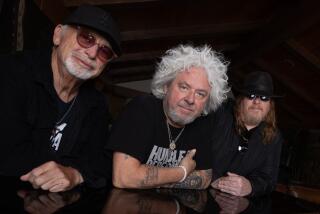Jazz Artists Are Going in New Directions : Composer: Internationally known Rique Pantoja, who plays in San Juan Capistrano tonight, works toward wider fame in the U.S.
Rique Pantoja has been a fixture on the international jazz scene for years, having toured and recorded with Lee Ritenour and Sadao Watanabe as well as with the late Chet Baker. But the Brazilian composer, keyboardist and guitarist has yet to become widely known in the United States. âIâm having to pay my dues again,â said Pantoja, who moved from Brazil to Los Angeles last summer.
Pantoja began making inroads long before he settled in this country. Those who saw âLetâs Get Lost,â director Bruce Weberâs 1989 documentary on Bakerâs life, got a glimpse of Pantojaâs work: His song, âSo Hard to Knowââ was performed by the famed trumpeter in the film, and an early Baker-Pantoja recording was released here by Warner Bros. in 1989. âUnfortunately, the album âgot lostâ too,â Pantoja said. âIt was marketed as new wave and didnât sell.â
Pantoja will perform tonight at the San Juan Capistrano Regional Library courtyard. Accompanying him will be Seiku Bunch on bass, Ephraim Toro on drums, Rob Lockhart on saxophone and flute, and Cassio Duarte on percussion. The group will perform songs from â1,000 Watts,â Pantojaâs forthcoming album with saxophonist Ernie Watts, and material from âCama de Gato,â an album he and his former quartet recorded and released in Brazil.
Pantoja, 36, first came to the United States in 1975 to study at the Berklee School of Music and the New England Conservatory of Music in Boston. âMy main interest has always been composing. I came to Boston to study under Charlie Banacos, who was considered the master of jazz composition,â said Pantoja, whose family wanted him to become an engineer.
Four years later, Pantoja moved to Paris, hoping to study under composition instructor Nadia Boulanger, whose list of private pupils included Aaron Copland and David Diamond. âI met her, but she was much too old by then,â Pantoja said. Instead, he pored over notes he borrowed from Boulangerâs former students, still hoping to gain insight from her theory.
Pantoja formed a quartet and began playing in Paris jazz clubs. His first break came while performing at a Latin Quarter club named Petito Opportun, which means âlittle opportunity.â Chet Baker was performing at a club next door, and the legendary jazz trumpeter slipped into Pantojaâs performances between sets. âOne night he brought his trumpet along and joined us from the audience,â Pantoja said. âI was overwhelmed. I had no idea heâd been coming to hear us.â
Impressed with his composing abilities, Baker recorded six of Pantojaâs songs on his next album and took Pantoja with him on the road for nearly a year. âI was only 24 years old, and the chance Baker gave me meant everything. It gave me incentive to keep composing,â Pantoja said.
In 1981 Pantoja returned to Brazil. When he invited Baker to his homeland to perform at the Free Jazz Festival in Rio de Janeiro in 1985, he learned that the American musician had profoundly influenced the early 1960s Brazilian bossa nova movement.
âWhen he played in Brazil, people started talking and writing about him. It came out that Joao Gilberto and Caetano Veloso, the fathers of bossa nova, learned to sing by listening to Chet Baker,â Pantoja said. âChet had always liked Brazilian music but had no idea that (Brazilian musicians) were listening to him too. Turns out they used to crowd into each othersâ houses to listen to his album âChet Baker Sings . â â
Pantoja was touring Japan with Milton Nascimento in 1988 when he heard that Baker died from a fall out of an Amsterdam hotel window. âIt was a great loss. He had the talent to find the one note that would carry the entire melody and make the others dance around it,â he said. âSome of the best musicians in the world admire him, and I will always be grateful for the chance he gave me.â
Pantojaâs trademark style of âvocaleseâ evolved from his attempts to sing along with recordings by James Taylor, Stevie Wonder and the Beatles without knowing the English lyrics. âI enjoyed American pop, even though I grew up around classical music and Latin jazz, because my father was an amateur musician,â he said. âBut it was Bill Evans, John Coltrane and Al Jarreau who influenced me to devote myself to jazz,â Pantoja said. âMy current style includes some northeastern Brazilian rhythms, but there are strong romantic overtones. I like ballads too,â he said.
Pantojaâs latest album, âLove Brought Us Here,â recorded with Ritenour on guitar, Paulinho da Costa on percussion, Phil Perry and Morgan Ames on vocals, Alex Acuna on drums and Ernie Watts on saxophone, was released in Japan in 1989, and Pantoja is working to bring it to the United States. âThe people who performed with me are some of the finest around,â Pantoja said. âI hope to give people in the U.S. an opportunity to hear it.â
More to Read
The biggest entertainment stories
Get our big stories about Hollywood, film, television, music, arts, culture and more right in your inbox as soon as they publish.
You may occasionally receive promotional content from the Los Angeles Times.










